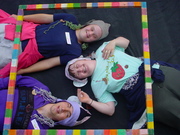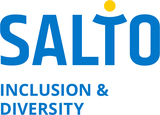Working with people with a Mental Disability
- Find this and a lot more in the SALTO Inclusion for All booklet: No Barriers, No Borders
It is a wrong assumption to think that people with a physical disability also have a mental disability. Therefore always start from the highest expectation regarding intellectual skills and capacities when interacting with people with a disability and if needed adapt gradually to a lower standard (and not the other way around!).
Some tips for your programme and activities
- Be specific in the things you say or ask. Avoid figurative speech, difficult expressions and subtleties like irony or sarcasm,... But don't go to the other extreme: baby-talk. People with cognitive disabilities also disserve respect.
- Take things light-heartedly, smile and send positive vibes as a way of communication. Don't rely on verbal communication only. Some visual support like a picture or a symbol might help.
- Be patient, flexible and supportive. Take time to understand the individual and make sure the individual understands you. Ask questions to find out if the persons with a cognitive disability understood or not.
- Repeat as many times as necessary, in different ways, and check their understanding. Take time and respect their speed. Don't assume people understood all the information or will remember it.
- Reduce long introductions to activities and cut up the activities and explanations into different sequential parts, which you introduce one at a time. Help make complex ideas understandable by breaking them down into smaller digestible parts.
- If you use powerpoint presentations, handouts or other written material support the content with visuals and use short uncomplicated sentences conveying just one concept or action at a time.
- Use different creative ways of expression in your programme e.g. art, dance, painting, collage, theatre,...
- Offer assistance (you can ask someone from the group) for demanding intellectual tasks (e.g. writing, completing forms, understanding written instructions). However wait for the individual to accept the offer of assistance; do not "over-assist" or be patronising.
- Make sure the participants with a cognitive disability (as any other participants) understand the group rules for your activity: what is and isn't acceptable behaviour.
- It can be difficult for people with cognitive disabilities to make quick decisions. Let them know in advance what decisions need to be taken so that they can take extra time for decision-making.
- Persons with mental disabilities might have trouble concentrating in an over-stimulating environment e.g. too many people, too much noise, too vivid colours,... Take care to provide a working space that allows them to concentrate (when needed).
- If you are in contact with other groups/people and the persons with a mental disability behave strangely, you can simply explain it to the passers-by. Strange behaviour can be part of their condition but it is not dangerous or contagious.
- The reaction of the group leader towards strange behaviour is often taken on by other members of a group. If you react calmly to troublesome behaviour, the rest of the group probably does as well. If you panic, the rest of the group might panic as well.
- It would be good to do activities in your project in which the people with cognitive disabilities can show their abilities and skills. Some are good at sports, singing, maths,... This would support their position and prestige in the group. You could create a fair of skills, in which every participant offers a skill to the group (e.g. singing, massage, telling jokes,...)
- Ask persons with learning disabilities what helps them to understand and remember e.g. some people benefit from writing instructions down or from saying them aloud
- Persons with Asperger syndrome or autism (or other cognitive disabilities) can have panic reactions towards certain objects (e.g. tunnels, colours,...) or in certain situations. It can be helpful to find out from the person, the parents or a social worker what causes these reactions (so you can avoid them) and what can comfort this person (in case it happens anyway). Often however, it is a process of trial and error.
- Some people with traumatic brain injury might have a poor short-term memory or poor social skills. You can consider having a personal assistant take care of this person (e.g. guiding the interaction with the group, following instructions, etc...)
- People with Tourette's syndrome undergo spells of involuntary speech, swearing or uncontrolled movements. Wait until the person has finished and is calmed down and then continue as normal. Often, the more the person tries to contain these urges, the more they build up. It could be helpful for them to leave the session temporarily to release these compulsions and come back when calmed down.
- When a participant has a panic attack or behaves problematically in a public area with many distractions, you might consider moving to a quieter or more private location
- Clear signalisation with pictograms and arrows can help a person with cognitive disabilities to find their way around the venue.
- Make sure that you have an emergency procedure in place (e.g. in case of fire) and that the persons with a mental disability know what to do.
- ...
^^ top ^^

 Enabling ALL to participate
Enabling ALL to participate
Downloads
The following downloads are available:
- No Barriers No Borders - international mixed-ability projects - 2008 update
How to set up international projects with young people with and without a disability. With lots of tips & tricks about partnerships, funding, working with disability,... Based on SALTO TC Enable 2003
